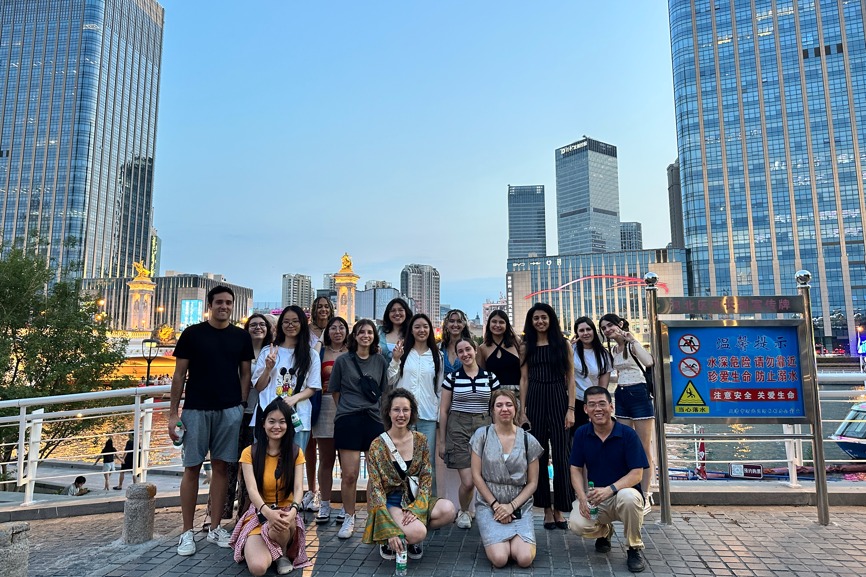New initiatives aim to expand HK's talent pool


Hong Kong Chief Executive Carrie Lam Cheng Yuet-ngor laid down a raft of measures in her Policy Address on Wednesday to attract young professionals in finance, law and aviation, as well as sci-tech scholars, to enrich the city's talent pool.
The Hong Kong leader took a multipronged approach, with wide-ranging initiatives to lure non-local professionals, including measures to facilitate cross-border mobility in the Guangdong-Hong Kong-Macao Greater Bay Area, in addition to support for cultivating local talent.
The annual quota of the Quality Migrant Admission Scheme will double to 4,000, a move that follows the government's doubling the quota from 1,000 in November. In the past year, more than 1,700 people entered Hong Kong under the program.
The administration also expanded its Talent List, promulgated in 2018 and covering 13 professions, to include professionals in asset management and in environmental, social, and governance issues, among others. The quota was also raised for professionals in microelectronics, integrated circuits design, and arts technology
The administration also expanded its Talent List, promulgated in 2018 and covering 13 professions, to include professionals in asset management and in environmental, social, and governance issues, among others. The quota was also raised for professionals in microelectronics, integrated circuits design, and arts technology.
The measures were made to promote Hong Kong's high-end economic development in line with the country's 14th Five-Year Plan (2021-25), which envisages Hong Kong enhancing its international standing in eight areas, including finance, innovation and technology, arts and culture, and dispute-resolution services.
To that end, the government also pledged to incorporate fintech courses into its continuing-education funds. Local universities were called to develop the student's knowledge, experience, and interests in this field with up-to-date curriculum designs and internship opportunities at local fintech companies.
For legal services, eligible visitors will be allowed to participate in arbitral proceedings in Hong Kong. Previously, they needed to obtain employment visas beforehand. The program, tried out by the Justice Department in June 2020, will strengthen Hong Kong's role as an international legal and dispute resolution service center in the Asia-Pacific region, Lam said.
Measures were also proposed to boost the personnel flow between Hong Kong and other cities in the Greater Bay Area to make the best of the special administrative region's talent pool for national development. The central government has agreed to study measures with the SAR government before the end of the year to boost the two-way flow of talent, including measures to facilitate non-Chinese Hong Kong residents to travel to the mainland cities of the Greater Bay Area for business and technological exchanges.
Measures were also proposed to boost the personnel flow between Hong Kong and other cities in the Greater Bay Area to make the best of the special administrative region's talent pool for national development
This is in response to the long-standing aspirations of the international chambers of commerce in Hong Kong and the growing need for cross-border cooperation in various fields, Lam said.
The Security Bureau and the Education Bureau are considering extending the Immigration Arrangement for Non-local Graduates program to cover graduates of Hong Kong universities' campuses in the mainland cities of the bay area. The arrangement, which allows graduates to seek employment in Hong Kong, currently applies only to non-local students in these universities' Hong Kong campuses.
To support universities' efforts to nurture research talent, the government proposed further relaxing the over-enrollment ceiling in research postgraduate programs funded by the University Grants Committee from 70 percent to 100 percent. It is also considering increasing the number of funded quotas.
Leonard Cheng Kwok-hon, president of Lingnan University of Hong Kong, welcomed the initiative and other measures supporting the development of universities and young people.
Cheng said such plans will help enhance the long-term development of Hong Kong universities in academic research and knowledge transfer, thereby strengthening the city's overall competitiveness and promoting professional training in the Greater Bay Area.
Chen Shuman in Hong Kong contributed to this story.
- Pioneering HIV/AIDS prevention drug launched in Hainan
- Experts: DPP's manipulation runs against Taiwan people's will
- Shanghai university launches AI platform for global scientific collaboration
- Rainstorm forces evacuation of over 3,000 residents in suburban Beijing
- Two dead, two missing after torrential rainfall in Hebei
- Recall vote shows DPP's manipulation runs against Taiwan people's will: mainland spokesperson




































